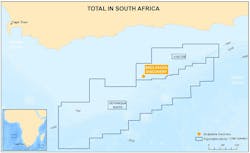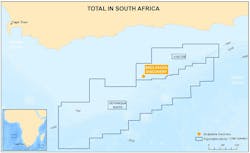Total reports deepwater gas-condensate discovery off South Africa
Total SA reported a natural gas-condensate discovery on Block 11B/12B in the Outeniqua basin, 175 km offshore southern South Africa. The Brulpadda well encountered 57 m of net gas-condensate pay in Lower Cretaceous reservoirs.
Patrick Pouyanne, Total chief executive officer, called Brulpadda one of several high-profile prospects for Total. “It is gas condensate and light oil [but] mainly gas. There are four other prospects on the license that we have to drill; it could be around 1 billion bbl of total resources of gas and condensate,” Pouyanne said.
Following success at the main objective, the well was deepened to a final depth of 3,633 m and was reported successful in the Brulpadda-deep prospect as well.
Kevin McLachlan, Total senior vice-president of exploration, said, “With this discovery, Total has opened a new world-class gas and oil play.”
Ben Payton, head of Africa for Verisk Maplecroft, a risk analysis and forecasting company, said, “The find is guaranteed to spark a new wave of interest in acquiring acreage” in South Africa’s deep water.
“The process of revising the country’s hydrocarbon legislation will now be catapulted onto the political frontline,” Payton said. “With just months to go until the general election, the government is set to come under intense pressure to ensure the industry delivers local benefits.”
Total, which holds 45% interest, and its partners plan to acquire 3D seismic surveys this year. Plans call for drilling up to four additional exploration wells on this license. Block 11B/12B covers 19,000 sq km in 200-1,800 m of water.
Partners are Qatar Petroleum with 25% interest, CNR international 20%, and Main Street, a South African consortium, with 10%.
South Africa outlined an energy strategy in 2018 to reduce its dependence on imported oil.
“If the next phase of the drilling campaign establishes an oil deposit, the find would appear ideally placed to fill a gap in the domestic market,” Payton said. “The full extent of the deposits at Brulpadda are still unknown, and a wide range of factors will need to be assessed to determine whether the discovery can be commercialized.”
Payton said Brulpadda is near existing pipelines.
Contact Paula Dittrick at [email protected].
About the Author
Paula Dittrick
Senior Staff Writer
Paula Dittrick has covered oil and gas from Houston for more than 20 years. Starting in May 2007, she developed a health, safety, and environment beat for Oil & Gas Journal. Dittrick is familiar with the industry’s financial aspects. She also monitors issues associated with carbon sequestration and renewable energy.
Dittrick joined OGJ in February 2001. Previously, she worked for Dow Jones and United Press International. She began writing about oil and gas as UPI’s West Texas bureau chief during the 1980s. She earned a Bachelor’s of Science degree in journalism from the University of Nebraska in 1974.


